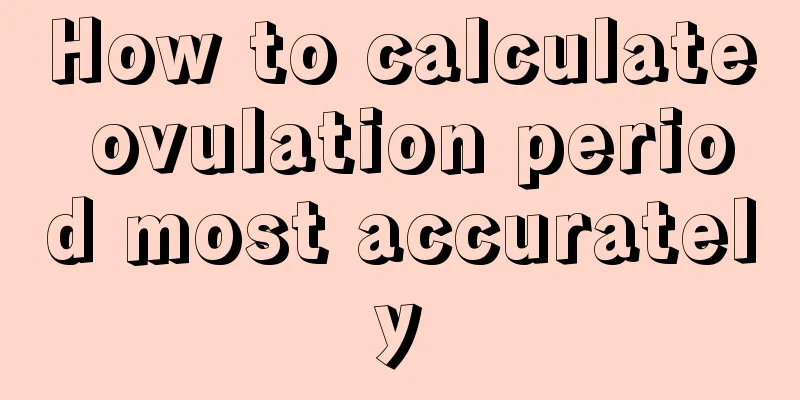How to calculate ovulation period most accurately

|
As we all know, if you want to get pregnant quickly, during the pregnancy preparation period, an extremely important thing is to accurately calculate the ovulation period, and then scientifically arrange the couple's sexual life to increase the chance of pregnancy. Well, let's learn here how to calculate the ovulation period most accurately. How to calculate ovulation most accurately 1. Observe cervical mucus (must be done in the hospital). 2. Ovulation temperature measurement method: The body temperature measured when the body wakes up after a long sleep (usually in the morning) and before any activities or talking is the ovulation temperature. Under normal circumstances, the body temperature of pregnant women during ovulation is lower in the first half of the menstrual period and lower during ovulation. It may suddenly or slowly rise by 0.3-0.6℃ within 24 hours to a few days after ovulation. Therefore, it is best to measure the ovulation temperature from the first day of menarche, adhere to the daily measurement, and record it on coordinate paper for observation and analysis. 3. Menstrual date calculation method: It is believed that each ovulation period should be about 14 days before the menarche, so the 5 days before ovulation to 5 days after ovulation is called the "ovulation period". However, this method is not very reliable because most women's menstruation is not so regular. In comparison, the first two methods are more reliable, but they are somewhat inconvenient. The simple and reliable calculation formula is: The first day of ovulation = the shortest menstrual cycle minus 18 days The last day of ovulation = the number of days in the most menstrual cycle minus 11 days Before using this calculation formula, you should observe and record your menstrual cycle for 8 consecutive times to obtain the longest and shortest days of your menstrual cycle. The data obtained by plugging into the above formula will represent the start and end time of the woman's "ovulation period". (The physiological cycle is calculated from the first day of the current menarche to the first day of the next menarche) For example, the physiological cycle of a pregnant woman in the first 8 months is 30 days at most and 28 days at the shortest. The formula is: The first day of ovulation = 28 days - 18 days = 10 days The last day of ovulation = 30 days - 11 days = 19 days That is, the woman's "ovulation period" starts on the 10th day of her menarche and ends on the 19th day of her menarche. If you observe carefully, you find that your menstrual period is very regular: once every 28 days, then you can include the longest and shortest days of your menstrual cycle into 28 days, and plug it into the formula to calculate your "ovulation period" as: the 10th to 17th day of your first menstruation. This type of calculation method uses the first day of the current menarche as the reference point and counts the days forward, rather than using the next menarche as the reference point and counting backwards, so it is not easy to make mistakes. Four major changes in girls' ovulation period Generally speaking, the ovulation period is a stage that female friends must go through, but many female friends have little knowledge of the basic knowledge about this matter, which will lead to unexpected pregnancy. So, do you know what changes occur during ovulation? Unless you take androgen emergency contraceptive pills, women's bodies ovulate every month, and there are the following physiological changes every month. 1. Reduced appetite Studies have shown that women eat the least during ovulation, and experts believe that this is the result of human instinct that has been preserved to this day - female insects during ovulation will focus more on finding a male partner for mating rather than finding food. 2. Energetic This is also a natural instinct inherited from human genes. In order to successfully attract the opposite sex, women in the ovulation period will become more energetic and love to express themselves. 3. Want to rise Generally speaking, women's sexual desire during ovulation will be very strong, which is a reflection of the maximum body signal that women want to get pregnant. |
<<: How are uterine fibroids formed?
>>: The impact of humidity on breast milk
Recommend
Can early-stage cervical cancer be cured?
Cervical cancer is a disease that many women suff...
Targeted breast screening
In the hospital, there are all kinds of examinati...
Female body fat percentage comparison table
In addition to weight, each person's body fat...
What happens if I haven’t had my period for 5 months?
Menstruation is called menstruation because it co...
What happened to the loud noise in Wuhan? What happened to the loud noise in Wuhan in 2020?
The loud noise in Wuhan has become a hot topic? W...
What to do if your period doesn't come
Even if your period doesn't come, don't w...
The benefits of mugwort fumigation
Because women who have sex are actually very pron...
My period is 11 days late, what's going on?
The physiological phenomenon of female menstruati...
What does dried durian taste like? What are the benefits of eating dried durian for women?
The content of zinc and selenium in the trace ele...
Is the chance of pregnancy high with uterine fibroids?
It will also affect the patient's fertility a...
What is the difference between clinically diagnosed cases and confirmed cases? What is the significance of clinically diagnosed cases?
As we all know, the reason why the number of new ...
What department should I go to for infertility
Pregnancy is a very happy thing for women and fam...
What causes right breast pain?
Due to the complexity of their body structure, wo...
Cough, low fever, lack of energy, night sweats for more than 2-3 weeks, beware of tuberculosis!
Author: Chen Xiaoyou, Chief Physician, Beijing Di...
What to do if a pregnant woman has oral ulcers
Many pregnant women will experience oral ulcers d...









